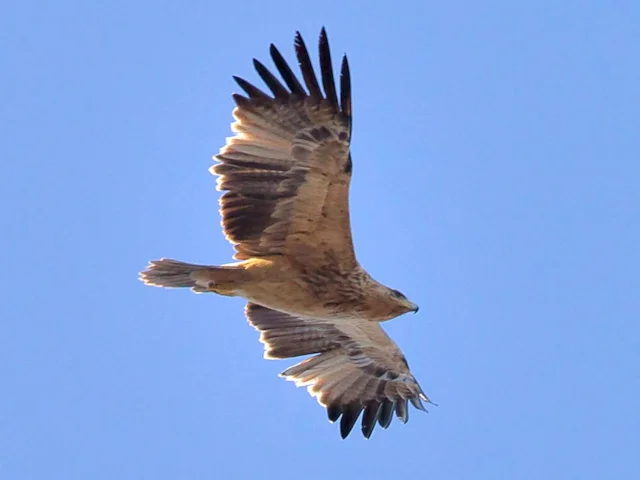Thousands of endangered raptors poisoned in Spain
26394695-10a7-4365-807e-de157646c3e8

Several thousand corpses of birds of prey, all declining or endangered species, were found poisoned in Spain in the first decade of this century, some by vulture-killing drug diclofenac.
Raptor corpses recovered included 2, 355 Red and Black Kites, 2,146 Griffon Vultures, 638 Black Vultures, 348 Egyptian Vultures, 114 Spanish Imperial Eagles and 40 Bearded Vultures. All were found poisoned in Spain between 2000 and 2010, according to the Spanish Ministry of Agriculture, Food and Environment, and all are threatened and protected under European Union law.
This poisoning is largely the result of baits used to kill predators and rodents. Many of these poisons are very strong and are not only harmful to birds but to wildlife in general (though more eco-friendly alternatives do exist). After years of campaigning by SEO (BirdLife in Spain), the Spanish government finally adopted a national strategy against illegal use of poison baits in the environment in 2004, aiming at dissuading users and increasing criminal prosecution, along with raising people’s awareness.
Every year around the world, hundreds of thousands of birds are the accidental victims of toxins used in widespread human activities, products including poison baits, lead shot from hunting and veterinary treatments such as diclofenac, which enter the ecosystem and concentrate at the top of the food chain. When they do not directly kill birds, these substances often affect the reproductive success of adults, threatening the survival of vulnerable both populations and the species as a whole.
Recent experience has shown that it is possible to minimise and prevent poisoning of birds of prey with relatively little effort and cost by following scientific recommendations. BirdLife Partners such as SEO, along with the RSPB in Britain, have been raising awareness of the deaths globally, and are achieving some success in the Indian subcontinent, where almost all vulture species were nearly annihilated by diclofenac.
The veterinary use of diclofenac is an increasing issue in Europe as a whole, as well as the Iberian peninsula. This drug is used on domestic cattle, but is extremely toxic to vultures and eagles. Having caused a dramatic 99% decline of the vulture population in southern Asia, it is still being prescribed to pets and livestock in Spain and across Europe, where a substantial part of the European vulture and eagle populations live.
To prevent an ecological catastrophe from happening in Europe, SEO/BirdLife together with the rest of the BirdLife Partnership is currently campaigning for a regional ban of veterinary diclofenac.
Raptor corpses recovered included 2, 355 Red and Black Kites, 2,146 Griffon Vultures, 638 Black Vultures, 348 Egyptian Vultures, 114 Spanish Imperial Eagles and 40 Bearded Vultures. All were found poisoned in Spain between 2000 and 2010, according to the Spanish Ministry of Agriculture, Food and Environment, and all are threatened and protected under European Union law.
This poisoning is largely the result of baits used to kill predators and rodents. Many of these poisons are very strong and are not only harmful to birds but to wildlife in general (though more eco-friendly alternatives do exist). After years of campaigning by SEO (BirdLife in Spain), the Spanish government finally adopted a national strategy against illegal use of poison baits in the environment in 2004, aiming at dissuading users and increasing criminal prosecution, along with raising people’s awareness.
Every year around the world, hundreds of thousands of birds are the accidental victims of toxins used in widespread human activities, products including poison baits, lead shot from hunting and veterinary treatments such as diclofenac, which enter the ecosystem and concentrate at the top of the food chain. When they do not directly kill birds, these substances often affect the reproductive success of adults, threatening the survival of vulnerable both populations and the species as a whole.
Recent experience has shown that it is possible to minimise and prevent poisoning of birds of prey with relatively little effort and cost by following scientific recommendations. BirdLife Partners such as SEO, along with the RSPB in Britain, have been raising awareness of the deaths globally, and are achieving some success in the Indian subcontinent, where almost all vulture species were nearly annihilated by diclofenac.
The veterinary use of diclofenac is an increasing issue in Europe as a whole, as well as the Iberian peninsula. This drug is used on domestic cattle, but is extremely toxic to vultures and eagles. Having caused a dramatic 99% decline of the vulture population in southern Asia, it is still being prescribed to pets and livestock in Spain and across Europe, where a substantial part of the European vulture and eagle populations live.
To prevent an ecological catastrophe from happening in Europe, SEO/BirdLife together with the rest of the BirdLife Partnership is currently campaigning for a regional ban of veterinary diclofenac.

